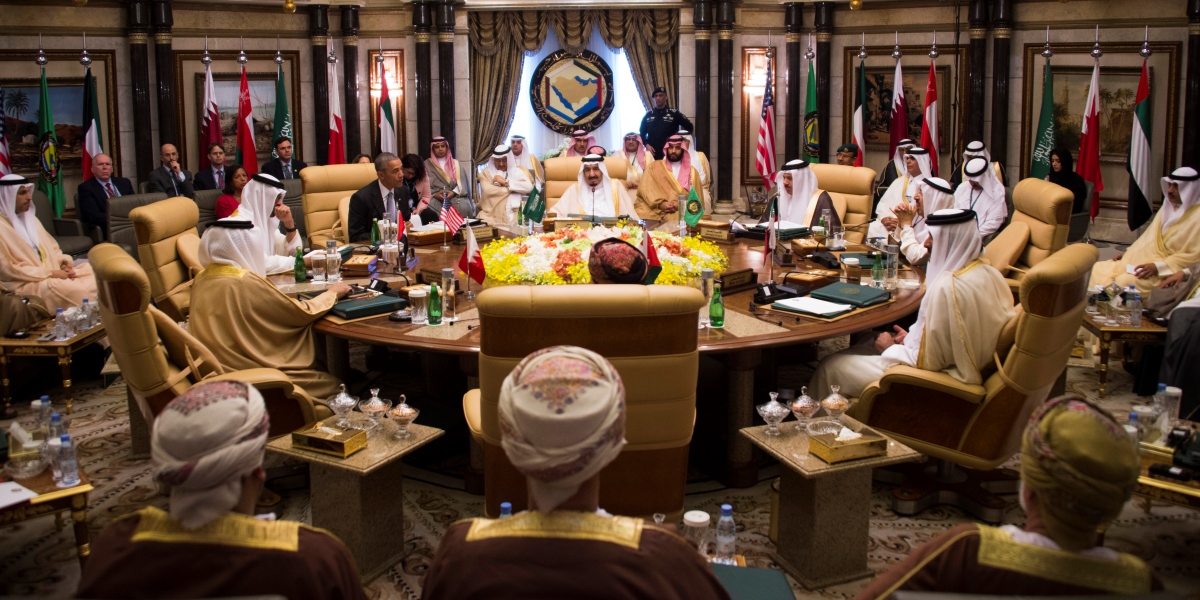
Obama in Riyadh: Can't Buy Me Love
The United States' failure to manage the Arab Spring revolutions coupled with its failure to enforce its red line following the Ghouta chemical attack raises questions among Saudi Arabia's ruling elite about Washington's reliability as an ally
Share
U.S. President Barack Obama visited Riyadh, Saudi Arabia earlier this week to attend the second United States-Gulf Cooperation Council summit and meet with Gulf leaders. Obama, whom Saudi King Salman notably did not greet at the airport, focused on a number of pressing issues, including the Syrian civil war, the situation in Yemen and the counter-DAESH effort. But it is hardly a secret that the main goal of his two-day visit was to address the concerns of U.S. allies in the region that have bristled at the Iran nuclear deal and the broader rapprochement between Washington and Tehran.
The outgoing U.S. president's Gulf tour was further complicated by a bipartisan bill, the Justice Against Sponsors of Terrorism Act, which would make it easier for families of 9/11 victims to sue foreign governments with alleged links to al-Qaida. According to U.S. media, Saudi Arabia warned that it would sell up to $750 billion in U.S. Treasury bonds if Congress passes the bill. The Obama administration, according to media reports, has been lobbying Congress to block the bill's passage. The White House threatened a veto and the State Department warned lawmakers not to put U.S. interests at risk. The problem at hand, however, is much bigger than the controversial bill.
In recent years, the Obama administration turned its back on Washington's traditional partnership with Israel, Turkey, Saudi Arabia and other U.S. allies in the Middle East. The decision made the region less safe by paving the way to a power struggle between regional actors. It also reflected what Obama thought about U.S. allies, "free riders," according to The Atlantic's Jeffrey Goldberg.
By redefining America's national interests, he made it clear that he would not place U.S. troops at risk and spend taxpayer money to fix the Middle East. For Saudi Arabia, the Obama doctrine meant that its strategic alliance with the United States, which dates back to the presidency of Franklin D. Roosevelt, was no longer sustainable.
With the exception of the 1973 OPEC crisis, the Cold War years were good to U.S.-Saudi relations, which were based on the Saudi dynasty's stability and a steady flow of oil to the world market. Things started to change in 2000 when then Israeli Prime Minister Ehud Barak and Palestinian Authority Chairman Yasser Arafat failed to reach an agreement at Camp David. The following year, al-Qaida perpetrated the 9/11 terror attacks to usher in a new era. However, it was Washington's willingness to let Iraq's Shiites – read Iran – hijack the country's central government following the U.S. withdrawal that marked a point of no return in U.S.-Saudi relations.
During the Obama years, the United States failed to manage the Arab Spring revolutions and eventually withdrew from the Middle East to perpetuate problems with Saudi Arabia. Egyptian President Hosni Mubarak's ouster, coupled with the Obama administration's failure to enforce a red line following the Ghouta chemical attack, raised questions about Washington's reliability as an ally among Saudi Arabia's ruling elite. But the Iran nuclear deal came to be seen as a step too far. Realizing that Obama was committed to isolationism, the Saudis had no choice but to redefine their relationship with the United States.
To be clear, Obama's efforts to mend ties with Saudi Arabia and Gulf countries are bound to fail. The fact that the Obama administration sold Saudi Arabia $95 billion worth of arms in seven years or a U.S. commitment to stage joint maritime patrols with Gulf Cooperation Council (GCC) nations to stop weapons smuggling from Iran are just tactical steps. At the end of the day, Gulf countries already know that buying more U.S. weapons or listening to U.S. officials talk about protecting the Gulf will not be enough to ensure their safety. Among other things, they understand that Iran's influence over Shiites across the Middle East poses a challenge that Washington cannot help them address. To make matters worse, they are concerned that Tehran will become even more aggressive as economic sanctions are lifted.
Gulf nations, like other U.S. allies in the Middle East, are dealing with the consequences of regional chaos powered by the Obama doctrine as they try to predict where the next president will stand on the Middle East. Provided that their relationship with the United States remains alarmingly unpredictable, Obama will not get to score any points with the Gulf anytime soon.
[Daily Sabah, April 23, 2016]
Tags »
Related Articles








